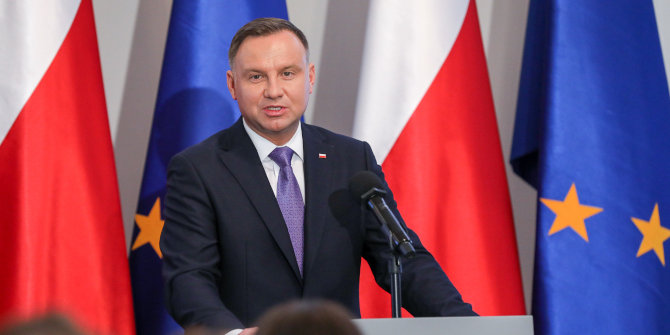The announcement of a partial mobilisation in Russia has promoted thousands of people to attempt to leave the country. Michael Ben-Gad argues that rather than discouraging Russian citizens from crossing their borders, Nato members should grant asylum to those wishing to leave as it would hasten the end of the war in Ukraine.
President Putin’s announced mobilisation of 300,000 reservists to reinforce his disintegrating invasion of Ukraine has led to long queues of Russian men trying to escape across the border. Unfortunately, many of Russia’s neighbours are refusing to give them refuge.
Lithuanian Defence Minister Arvydas Anusauskas has stated that “being drafted into the army is not enough.” In fact, Lithuania is a Nato member and Nato is engaged in helping Ukraine defend itself in every way short of active participation in combat. Until now, the three Baltic states have been admirably steadfast in their support for Ukraine. Yet rather short-sightedly they are now sending back what are in effect enemy soldiers.
Wars are won not by generating piles of enemy corpses, but by breaking the will of the enemy to carry on fighting. Military rounds, unlike the far deadlier hollow-point munitions supplied to civilian police forces, are designed to be fired at a distance and to pass through an enemy soldier’s body, leaving him wounded (and with any luck, also to hit and wound the soldier behind him). It is better to wound an enemy soldier than to kill him. Dead soldiers do not cry out in agony, distracting comrades and sapping their morale. Nor do they need to be immediately treated or bandaged and then carried by other soldiers on a stretcher to safety and further medical attention.
Better still is to capture an enemy soldier before he is hurt at all. Obviously, a soldier who surrenders is out of the fight, but what else? True, frightened and exhausted captives may divulge useful intelligence; but more often than not, the value of what little information ordinary soldiers may possess depreciates so fast on the rapidly shifting modern battlefield that its half-life can be measured in hours.
Instead, the true benefit is the impact it has on others. News that a soldier or an entire unit has surrendered creates a permission structure for others to also save themselves rather than risk death or serious injury. In short, like desertion, surrender is contagious. It is for this utilitarian reason, rather than moral ones, that disciplined armies work hard to instil in their soldiers an ethic that prioritises capturing prisoners, even when it entails a degree of risk, and then treating those prisoners humanely.
While some commanders may encourage a ‘take no prisoners’ attitude in their troops to instil aggression, more often than not such behaviour is a sign of an ill-disciplined force. In his revisionist history of the First World War, Niall Ferguson cites “the mass surrendering, not the mass killing, which signalled victory on all the Fronts” for the allies. That was indeed the perception of people at the time, as confirmed by George Hall’s study of changes in exchange rates on the Zurich currency market in response to news from the front.
Estonian foreign minister Urmas Reinsalu has told Reuters that “refusal to fulfil one’s civic duty in Russia or a desire to do so does not constitute sufficient grounds for being granted asylum in another country”. That is a very strange way for a Nato member’s top diplomat to characterise an unwillingness to fight in Putin’s failing imperial adventure. Latvian foreign minister Edgars Rinkēv, for his part, has stated that “Due to security reasons, Latvia will not issue humanitarian or other types of visas to those Russian citizens who avoid mobilisation.”
Clearly, all three Baltic states have reason to fear that some Russian men may be intelligence operatives sent to engage in sabotage, and they can be forgiven for not wanting to supplement their potentially irredentist Russian minorities. The Baltic states can at best serve as transit points. Other Nato members can and should step in and absorb them – something they can do without in any way burdening their economies.
The Russian government may, in the days to come, take steps to bar young men from leaving. Doing so would be an admission of failure and an acknowledgement that support for the war is ebbing. Meanwhile, the morale of the Russian army is already low and the defection to the West of thousands, perhaps tens of thousands of their potential comrades can only diminish it further.
One might even hope the offer of asylum generates a cascade of young men fleeing the country, reminiscent of the flight from East Germany that ultimately spelled the demise of that regime. That ultimately led to the collapse of the communist bloc and cut short the career of a certain KGB officer stationed at the time in Dresden. This new exodus may, with any luck, curtail Putin’s presidential career as well.
Note: This article gives the views of the author, not the position of EUROPP – European Politics and Policy or the London School of Economics. Featured image credit: © European Union



